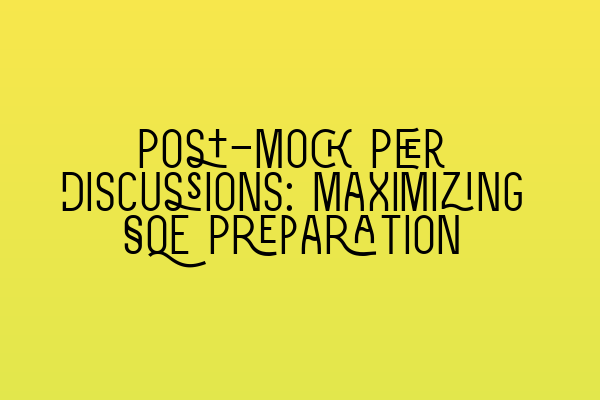Post-Mock Peer Discussions: Maximizing SQE Preparation
Preparing for the Solicitors Qualifying Exam (SQE) can be a daunting task. With its comprehensive curriculum and rigorous testing format, it is important for aspiring solicitors to adopt effective study strategies to maximize their chances of success. One such strategy is engaging in post-mock peer discussions, which can provide invaluable insights and enhance exam preparation. In this article, we will explore the benefits of post-mock peer discussions and how they can help you excel in the SQE.
The Power of Collaboration
Collaborative learning has been proven to be one of the most effective methods of studying. When you participate in post-mock peer discussions, you have the opportunity to engage with fellow students who are also preparing for the SQE. This collaborative environment allows you to share your knowledge, clarify doubts, and gain multiple perspectives on challenging concepts. By actively engaging in discussions, you solidify your understanding of the material and uncover new insights that may have otherwise eluded you.
Not only do post-mock peer discussions help you strengthen your knowledge, but they also foster a sense of camaraderie and support among the participants. Surrounding yourself with like-minded individuals who are committed to achieving the same goal creates a motivating and encouraging atmosphere, which can alleviate stress and boost your confidence during the exam preparation process.
Maximizing Exam Readiness
One of the key benefits of post-mock peer discussions is their ability to simulate the exam environment. By participating in these discussions, you become familiar with the format and structure of SQE questions. This experience helps you develop effective exam strategies, such as time management and critical thinking skills, which are crucial for success.
During the discussions, you can also assess your strengths and weaknesses. By identifying areas where you struggle or need improvement, you can tailor your study plan to focus on those specific topics. This targeted approach allows you to allocate your time and resources efficiently, ensuring that you cover all the necessary material and are well-prepared for the actual exam.
How to Conduct Post-Mock Peer Discussions
To get the most out of post-mock peer discussions, it is important to establish a structured and organized approach. Here are some tips to help you conduct effective discussions:
- Form a study group: Connect with fellow SQE candidates who are at a similar stage of preparation. You can find study partners through online forums, social media groups, or even your law school.
- Choose a facilitator: Appoint a facilitator who will organize and moderate the discussions. The facilitator can set the agenda, ensure everyone gets a chance to participate, and keep the discussions on track.
- Select relevant mock exams: Decide on the mock exams you want to discuss. It is advisable to choose a variety of exams that cover different topics and question types to ensure a comprehensive review.
- Allocate time for self-study: Prior to the discussion, allocate time for individual self-study. This allows each participant to attempt the mock exams independently and formulate their own answers before coming together for the discussion.
- Share answers and discuss: During the group discussion, each participant can share their answers and reasoning. Engage in a constructive dialogue, debating different interpretations and analyzing the strengths and weaknesses of each response.
- Take notes: Encourage participants to take notes during the discussion. These notes can serve as a valuable resource for revision and as a reference point when reviewing the material later.
- Reflect and implement feedback: After the discussion, take time to reflect on the feedback received and identify areas for improvement. Implement the feedback into your study plan and make adjustments to strengthen your understanding of the subject matter.
Conclusion
Post-mock peer discussions are an essential component of effective SQE preparation. By engaging in collaborative learning, simulating the exam environment, and receiving feedback from peers, you can enhance your understanding of the material and increase your chances of success. Remember, studying for the SQE is not a solitary journey; by leveraging the power of peer discussions, you can unlock your full potential and achieve your goal of becoming a qualified solicitor.
For more expert insights on solicitors in UK courts, tips for success, and helpful exam preparation resources, check out these related articles:
- Expert Insights: Solicitors in UK Courts – Tips and Strategies for Success
- SQE Exam Study Group: Collaborative Learning for Exam Preparation
- SQE Exam Prep Resources: Tools for Effective Exam Preparation
- Essential Considerations for International Business Ventures
- Exploring Legal Procedures: UK vs Delaware

Leave a Reply